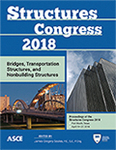Structures Congress 2018
Application of a Sequence-Free Iterative Structural Identification Framework for Reserve Capacity Estimation of a Steel-Concrete Composite Bridge
Publication: Structures Congress 2018: Bridges, Transportation Structures, and Nonbuilding Structures
ABSTRACT
Most civil engineering structures are designed using justifiably conservative models with the goal of achieving life-safety. The use of conservative models during design and safe construction practices creates reserve capacity enabling structures to last well beyond their design life. Understanding structural behaviour can enhance the effectiveness of asset-management tasks such as retrofit or replacement of these structures. With advances in sensing and computing technology, it is now possible to interpret vast amounts of measurement data to evaluate structural performance. In this paper, the application of a sequence-free iterative structural identification framework on a steel-concrete composite bridge is presented. The iterative nature of decision-making is illustrated through varying conditions during the service life of the bridge, in this case increased traffic intensity. The engineer utilises new information as it becomes available to update knowledge of structural behaviour and thus update predictions of reserve capacity.
Get full access to this article
View all available purchase options and get full access to this chapter.
ACKNOWLEDGEMENTS
This work was funded by the Swiss National Science Foundation under contract no. 200020-169026 and Singapore-ETH Centre (SEC) under contract no. FI 370074011-370074016. The authors would like to acknowledge the assistance provided by A. Nussbaumer in elaboration of the case study and fatigue-life evaluation.
REFERENCES
Alvin, K. (1997). “Finite element model update via Bayesian estimation and minimization of dynamic residuals.” AIAA journal, 35(5), 879–886.
Beck, J. L., and Katafygiotis, L. S. (1998). “Updating models and their uncertainties. I: Bayesian statistical framework.” Journal of Engineering Mechanics, American Society of Civil Engineers, 124(4), 455–461.
Dowling, N. E. (1971). “Fatigue failure predictions for complicated stress-strain histories.” Illinois University at Urbana.
Farrar, C. R., and Worden, K. (2012). Structural health monitoring: a machine learning perspective. John Wiley & Sons.
Goulet, J.-A., Kripakaran, P., and Smith, I. F. C. (2010). “Multimodel structural performance monitoring.” Journal of Structural Engineering, American Society of Civil Engineers, 136(10), 1309–1318.
Goulet, J.-A., Michel, C., and Smith, I. F. C. (2013). “Hybrid probabilities and error-domain structural identification using ambient vibration monitoring.” Mechanical Systems and Signal Processing, 37(1), 199–212.
Goulet, J.-A., and Smith, I. F. C. (2013). “Structural identification with systematic errors and unknown uncertainty dependencies.” Computers & Structures, Elsevier, 128, 251–258.
Matsuishi, M., and Endo, T. (1968). “Fatigue of metals subjected to varying stress.” Japan Society of Mechanical Engineers, Fukuoka, Japan, 68(2), 37–40.
Miner, M. A. (1945). “Cumulative fatigue damage.” Journal of Applied Mechanics, 12(3), A159--A164.
Pai, S. G. S., Nussbaumer, A., and Smith, I. F. C. (2017). “Traffic-based condition assessment and fatigue-life predictions for a highway bridge.” SEI Structures Congress 2017: Business, Professional Practice, Education, Research, and Disaster Management, Denver Colorado, American Society of Civil Engineers (ASCE), Reston, Virginia.
Pasquier, R., and Smith, I. F. C. (2015). “Robust system identification and model predictions in the presence of systematic uncertainty.” Advanced Engineering Informatics, Elsevier, 29(4).
Pasquier, R., and Smith, I. F. C. (2016). “Iterative structural identification framework for evaluation of existing structures.” Engineering Structures, 106, 179–194.
Information & Authors
Information
Published In
Structures Congress 2018: Bridges, Transportation Structures, and Nonbuilding Structures
Pages: 275 - 286
Editor: James Gregory Soules, CB&I
ISBN (Online): 978-0-7844-8133-2
Copyright
© 2018 American Society of Civil Engineers.
History
Published online: Apr 17, 2018
Published in print: Apr 17, 2018
Authors
Metrics & Citations
Metrics
Citations
Download citation
If you have the appropriate software installed, you can download article citation data to the citation manager of your choice. Simply select your manager software from the list below and click Download.
